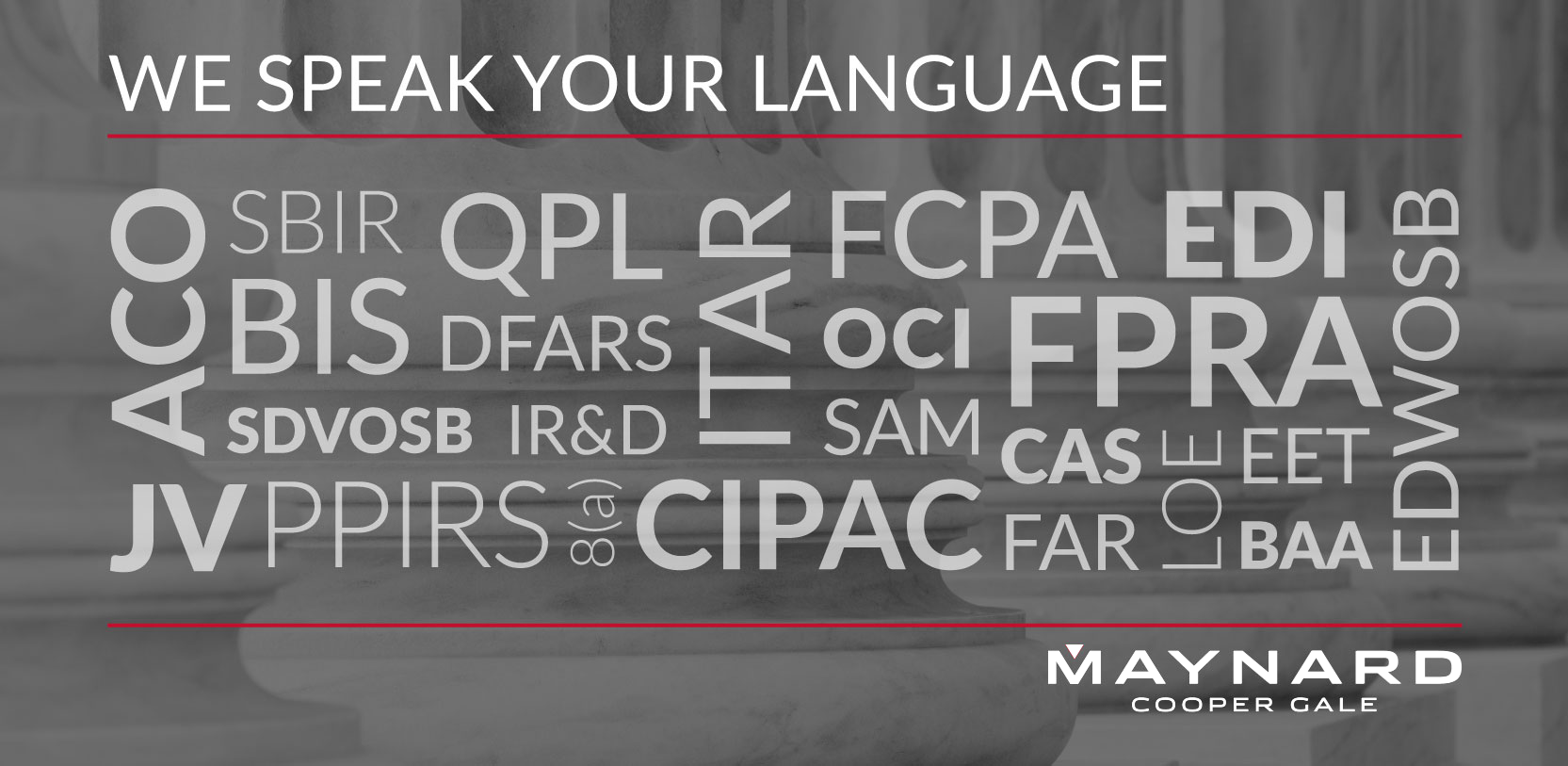Blog

On Friday, September 24, 2021, the Safer Federal Workforce Task Force ("Task Force") published its Guidance for Federal Contractors and Subcontractors ("Guidance"). This Guidance follows President Biden's Executive Order 14042, Ensuring Adequate COVID Safety Protocols for Federal Contractors ("EO") and provides definitions, three sections of contractor guidance, and a host of Questions and Answers ("Q&A") to assist contractors in implementing the President's vaccine mandate and workplace safety measures.
Briefly, the Guidance is broad and the vaccine mandate (beginning December 8, 2021) applies to employees that are "working on or in connection with a covered contract or working at a covered contractor workplace," which includes remote workers and others not directly working on a government contract (i.e., HR, billing, legal). Notably, the Guidance does not provide an exception for employees with a negative COVID-19 test result or that have had a prior COVID-19 infection. The Guidance also includes masking and physical distancing requirements and a requirement that "[c]overed contractors shall designate a person or persons to coordinate implementation of and compliance with this Guidance.”
Although there are a number of key dates interspersed in the Guidance, discussed below, the most important issue in determining whether a federal contractor is required to follow this Guidance is whether that federal contractor has a new contract with an effective date on or after October 15, 2021 or whether it has an existing contract with an option or renewal taking effect on or after October 15, 2021, and the government customer has added to such contract or option the new Federal Acquisition Regulation (“FAR”) clause regarding compliance. For this reason, references to a December 8, 2021 deadline to be “fully vaccinated” may not be applicable to a significant portion of federal contractors. That said, because the Guidance also applies to subcontractors (at any tier), those entities should consider opening a dialogue with team members to see if and when their prime contractor’s contract will be subject to the requirements under the Guidance and EO.
Below is a brief overview of the 14-page Guidance for government contractors.
The Guidance provides some important dates:
- October 8, 2021 – "The FAR Council will develop a clause and recommend that agencies exercise their authority to deviate from the FAR using the procedures set forth in subpart 1.4. Agencies responsible for contracts and contract-like instruments that are not subject to the FAR, such as concession contracts, will be responsible for developing appropriate guidance by October 8, 2021 to incorporate requirements into their covered instruments entered into on or after October 15, 2021."
- October 15, 2021 – The key date after which solicitations and exercised options, extensions or renewals of existing federal contracts must incorporate the new FAR clause, triggering a compliance obligation for the subject federal contractors. Agencies are “encouraged” to include the clause in contracts awarded between October 15, 2021 and November 14, 2021, unless the solicitation was issued on or after October 15, 2021.
- November 14, 2021 – The new FAR clause must be incorporated into all new covered contracts that are awarded on or after November 14, 2021.
- December 8, 2021 – The date on which covered contractors must begin to require their covered contractor employees to be "fully vaccinated" (unless the employee is legally entitled to an accommodation).
The Guidance provides several definitions, including (non-exhaustive):
- Covered contract – means any contract or contract-like instrument that includes the clause described in Section 2(a) of the order.
- Note: EO Section 2(a) points to Section 5(a) for applicability. EO Section 5(a) provides that the EO applies to any new contract; new contract-like instrument; new solicitation for a contract or contract-like instrument; extension or renewal of an existing contract or contract-like instrument; and exercise of an option on an existing contract or contract-like instrument, if:
- it is a procurement contract or contract-like instrument for services, construction, or a leasehold interest in real property;
- it is a contract or contract-like instrument for services covered by the Service Contract Act, 41 U.S.C. 6701 et seq.;
- it is a contract or contract-like instrument for concessions, including any concessions contract excluded by Department of Labor regulations at 29 CFR 4.133(b); or
- it is a contract or contract-like instrument entered into with the Federal Government in connection with Federal property or lands and related to offering services for Federal employees, their dependents, or the general public
- Covered contractor – means a prime contractor or subcontractor at any tier who is party to a covered contract.
- Covered contractor workplace – means a location controlled by a covered contractor at which any employee of a covered contractor working on or in connection with a covered contract is likely to be present during the period of performance for a covered contract. A covered contractor workplace does not include a covered contractor employee’s residence.
- Contract and contract-like instrument – has the meaning set forth in the Department of Labor’s proposed rule, “Increasing the Minimum Wage for Federal Contractors,” 86 Fed. Reg. 38,816, 38,887 (July 22, 2021). If the Department of Labor issues a final rule relating to that proposed rule, this term shall have the meaning set forth in that final rule.
- Covered contractor employee – means any full-time or part-time employee of a covered contractor working on or in connection with a covered contract or working at a covered contractor workplace. This includes employees of covered contractors who are not themselves working on or in connection with a covered contract.
- Federal workplace – means any place, site, installation, building, room, or facility in which any Federal executive department or agency conducts official business, or is within an executive department or agency’s jurisdiction, custody, or control.
- Fully vaccinated – People are considered fully vaccinated for COVID-19 two weeks after they have received the second dose in a two-dose series, or two weeks after they have received a single-dose vaccine. There is currently no post-vaccination time limit on fully vaccinated status; should such a limit be determined by the Centers for Disease Control and Prevention, that limit will be considered by the Task Force and OMB for possible updating of this Guidance for an exception for employees with a negative COVID-19 test result.
The phrase "in connection with" a covered contract is broad:
- Work performed in connection with means "[e]mployees who perform duties necessary to the performance of the covered contract, but who are not directly engaged in performing the specific work called for by the covered contract, such as human resources, billing, and legal review, perform work in connection with a Federal Government contract." (Q&A No. 17.)
The Guidance requires covered contractor employees to be fully vaccinated by December 8, 2021:
- "Covered contractors must ensure that all covered contractor employees are fully vaccinated for COVID-19, unless the employee is legally entitled to an accommodation. Covered contractor employees must be fully vaccinated no later than December 8, 2021. After that date, all covered contractor employees must be fully vaccinated by the first day of the period of performance on a newly awarded covered contract, and by the first day of the period of performance on an exercised option or extended or renewed contract when the clause has been incorporated into the covered contract." (Guidance No. 1.)
- A covered contractor may be required to provide an accommodation to a covered employee "because of a disability (which would include medical conditions) or because of a sincerely held religious belief, practice, or observance."
- A negative Covid-19 test result is not a substitute for proving vaccination status: "A covered contractor cannot accept a recent antibody test from a covered contractor employee to prove vaccination status." (Q&A No. 6.)
- No self-attestation on vaccine status: Covered contractors must review its covered employees’ vaccination documentation. Where an employee loses or does not have a copy of its vaccination card, the Guidance provides that “[a]n attestation of vaccination by the covered contractor employee is not an acceptable substitute for documentation of proof of vaccination.” (Q&A No. 3.)
- The Guidance provides that covered contractor employees who have had a prior COVID-19 infection are still required to be vaccinated. (Q&A No. 5.)
The Guidance requires all individuals in covered contractor workplaces observe Centers for Disease Control and Prevention ("CDC") guidance on masks and physical distancing:
- "Covered contractors must ensure that all individuals, including covered contractor employees and visitors, comply with published CDC guidance for masking and physical distancing at a covered contractor workplace, as discussed further in this Guidance." (Guidance No. 2.)
- "A covered contractor may be required to provide an accommodation to covered contractor employees who communicate to the covered contractor that they cannot wear a mask because of a disability (which would include medical conditions) or because of a sincerely held religious belief, practice, or observance. A covered contractor should review and consider what, if any, accommodation it must offer."
The Guidance requires covered contractors to designate a person to coordinate workplace safety efforts:
- "Covered contractors shall designate a person or persons to coordinate implementation of and compliance with this Guidance and the workplace safety protocols detailed herein at covered contractor workplaces. The designated person or persons may be the same individual(s) responsible for implementing any additional COVID-19 workplace safety protocols required by local, State, or Federal law, and their responsibilities to coordinate COVID-19 workplace safety protocols may comprise some or all of their regular duties." (Guidance No. 3.)
The Guidance covers small businesses and remote workers:
- Small Business – "Yes, the requirement to comply with this Guidance applies equally to covered contractors regardless of whether they are a small business." (Q&A No. 14.)
- Remote – "An individual working on a covered contract from their residence is a covered contractor employee, and must comply with the vaccination requirement for covered contractor employees, even if the employee never works at either a covered contractor workplace or Federal workplace during the performance of the contract." (Q&A No. 11.)
The Guidance provides a phased approach:
- "Contracts awarded prior to October 15 where performance is ongoing – the requirements must be incorporated at the point at which an option is exercised or an extension is made." (Q&A No. 12.)
- "New contracts – the requirements must be incorporated into contracts awarded on or after November 14. Between October 15 and November 14, agencies must include the clause in the solicitation and are encouraged to include the clause in contracts awarded during this time period but are not required to do so unless the solicitation for such contract was issued on or after October 15." (Q&A No. 12.)
Takeaway
The Task Force's Guidance is broad and appears to cover a significant portion of contractor employees, including those that are not directly working on a government contract. The December 8, 2021 deadline for covered contractor employees to be “fully vaccinated” although imminent, may not be applicable to a significant portion of federal contractors for whom this compliance obligation will not take effect until the next newly awarded covered contract or contract option entered into after October 15, 2021 that contain the new FAR clause. Still, given that the Guidance also applies to subcontractors (at any tier) and that compliance obligations may be a complex undertaking, covered contractors should consider setting up processes and procedures to ensure compliance sooner rather than later. In the meantime, we will keep an eye out for any new updates to this contractor Guidance.
-----
Please reach out to a member of Maynard's Government Solutions Group if you have any questions or need assistance.
- Attorneys
Matt’s national practice and unique talent stack encompass a broad skill set in the laws affecting the workplace, including labor and union relations, employment litigation, employee benefits, trade secrets and restrictive ...
- Attorneys
Joshua Duvall is a Shareholder in the Washington, D.C. office of Maynard Nexsen and is a member of the firm's Cybersecurity & Privacy Practice Group and Government Solutions Practice Group.
As a member of the Government Solutions ...


